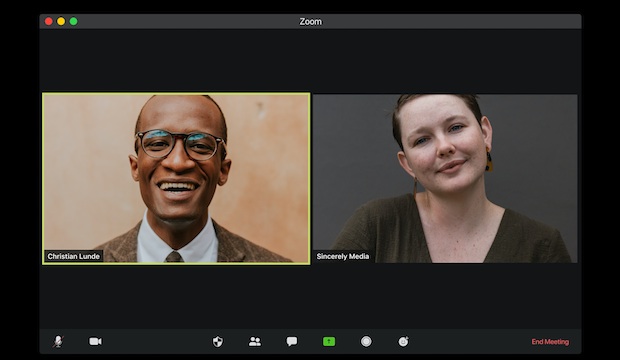Why now is the best time to learn a language online
Hoping to learn a new language online? Rather than settling for one-way lessons on an app, explore the far more enriching experience of learning in a virtual classroom
Why now is the time to learn a new language
In partnership with the Goethe-Institut
By now, we're comfortably bedded into our lockdown routines, yet many of us still have a niggling feeling that we should be using this time to learn a new skill. If, for you, this urge takes the form of fulfilling a life-long ambition to learn a new language, read on for some advice…
Why now?
While physical trips to foreign destinations are impossible right now, you can mentally prepare yourself for your next holiday – or even a move abroad – by using this downtime to begin learning the language of your chosen destination. If nothing else, this linguistic immersion in another culture will provide you with a bit of virtual escapism. Setting yourself goals and regular learning challenges will give you a sense of purpose in lockdown – not to mention something to look forward to once travel restrictions are lifted.
At the same time, there’s no need to pin your intentions on a specific trip. Many of us know exactly which language we’d love to learn, even if we have no plans to travel to its country of origin in the near future. After all, the mastering of a new language is fulfilling in itself and a way of keeping the brain stimulated while less busy with work. What’s more, it’s a positive distraction from the daily churn of largely depressing news stories.
Whatever the reasoning behind your desire to learn a new language, if the lockdown has left you with more time on your hands, now is the time to get cracking.

The benefits of learning in a virtual classroom
Language apps such as Babbel, Duolingo and Memrise have become the initial go-to when we want to dip a toe in the waters of a new language. Free (or cheap) to download, flexible on commitment and a great alternative for those who are classroom shy, it’s no wonder these apps have multiplied in numbers and won such worldwide popularity. But do they really work?
Writer David H Freedman isn’t convinced. In a piece for The Atlantic, he commented that his 70+ hours of lessons on Duolingo had made him ‘a master of multiple-choice Italian’, while leaving him ‘speechless’ on how to communicate without a prompt. With the supplementary help of a dictionary or textbook, he was able to correct his grammar, but this style of learning offers no interaction or moral support for your efforts – and no one is able to provide feedback or correct your pronunciation.
Eric Ravenscraft, writing in The New York Times, described a similar experience after having committed to over 500 consecutive days of short and snappy lessons on Duolingo. ‘You can definitely learn some things from an app, but if you want to become fluent in a language – or even conversational – they won’t be enough,’ he concludes. ‘Learning a language with an app should be a starting point, not the end… language apps are not other humans. You can learn as many words or sentences as you want, but until you’re able to have a conversation with another person, you’ll never be fluent.’

Enter virtual classrooms, ‘the education method of the 21st century’, says Zdrava Stoeva of e-learning platform Vedamo. ‘In this global world, online education gives us the freedom to choose and adapt our learning styles to fit our lifestyle,’ she says.
With their traditional classroom structure and one-to-one assistance from a tutor who can also provide bespoke post-lesson material to further aid your learning, virtual lessons are every bit as effective as their face-to-face counterparts. ‘Research suggests there’s no significant difference in outcomes whether from "traditional" or distance-learning courses,’ says Steffanie Zazulak, writing on the Pearson Education website. ‘It’s convenient, allowing people to learn in their own time, in their own space, rather than having to attend a timetabled course far from home or work, and can give a greater flexibility in what is learned, and at what stage of the process.’
Can socialising help you learn a language?
‘Studying in an online environment enables students from all over the world to work together in one place: the virtual classroom,’ says Stoeva. Unlike learning on an app, which can offer only computer-generated feedback, or a textbook, which cannot offer even that, a virtual classroom allows teachers and students to communicate directly, while encouraging students to make new contacts, be part of a community of people with shared interests and cooperate with one another – all of which forms a positive and engaging learning environment.
A pioneering organisation that’s leading the way: the Goethe-Institut
If it’s German you’re looking to learn, you’re in luck. The Goethe-Institut – a non-profit German institution with 159 branches around the world, including one in South Kensington– has long been heralded as an inspiring hub of culture and education. Now, it’s launching online language courses to allow its community to study in a safe and socially distanced environment while in lockdown.
The new online courses, which are available for registration until 5 May, are being presented in virtual classrooms with online group sessions, individual exercises and a chance for students to receive collective support as well as individual feedback on their progress. The courses last up to 16 weeks and are certified and personalised, covering a range of different ability levels.
‘It's more than just learning the language. The highly qualified teachers are native speakers and simultaneously immerse you into German culture,’ says Dr Georgia Herlt, head of the language department and deputy director of the Goethe-Institut. ‘In times when neither travel nor real face-to-face communication is possible, learning a new language will take you right under the skin of other nations and cultures.’
A cultural association as well as a language centre, the Goethe-Institut encourages international cultural exchange and provides its students with access to its rich programme of book clubs, digital performances, panel talks and lectures – all of which has been moved online for lockdown. If anything, being part of the Goethe-Institut vibrant community is easier than ever.
To find out more or book a course with the Goethe-Institut, click here.
TRY CULTURE WHISPER
Receive free tickets & insider tips to unlock the best of London — direct to your inbox
| What | Why now is the best time to learn a language online |
| When |
30 Apr 20 – 23 Aug 20, Class times vary |
| Price | £TBD |
| Website | Click here for more information and to book |